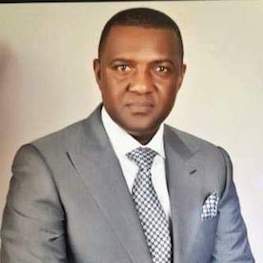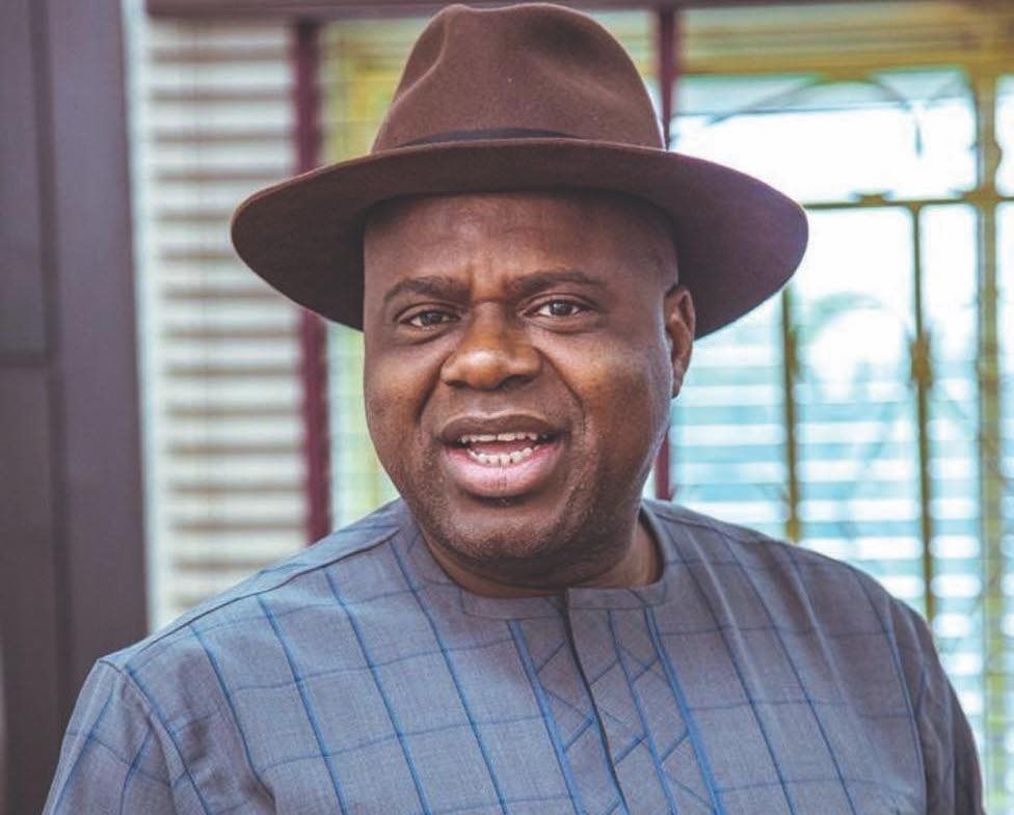FEATURES
HYPPADEC: Impacting lives in host communities

….Impacting lives in host communities
There is no gain saying the Hydroelectric Power Producing Area Development Commission (HYPPADEC), under the leadership of its Managing Director, Alhaji Abubakar Sadiq-Yelwa, is making positive impacts on the lives of residents of host communities.
States currently under the jurisdiction of HYPPADEC include Niger, Kebbi, Benue, Plateau, Kogi and Kwara, however, Taraba, Gombe, Nasarawa and Kaduna have just been included because of the new provisions of the Electricity Act.
There are currently 10 states covered by the HYPPADEC, as the other four states of Taraba, Gombe, Nasarawa and Kaduna are authomatic members in line with the provisions of the new electricity law.
Since its inauguration in December 2020 by former President Muhammadu Buhari, the commission has continued to consistently deliver on its mandate by improving the living standard of the host communities.
Indeed, the programmes and policies put in place by the commission has continued to cushion the ecological, socioeconomic and psychological effects of the dams on the communities that suffered a great deal of imbalance from the projects without commiserate reward to bridge the gap created in their lives over the years.
With the way and manner the commission is being managed, one can safely say that the vision of the founding fathers to fashion out interventionist measures to communities affected by the activities of hydroelectricity, especially in host communities is being achieved gradually.
Over the years, the 227 political wards under the commission suffered neglect due to lack of proper attention by the Federal Government despite their huge contribution to the development of the country.
Read Also: HYPPADEC Inaugurates Anti-Corruption Unit
However, with the hope being given by the HYPPADEC management, it is safe to say that these communities that were hitherto neglected are beginning to enjoy better life.
Considering that the major challenge of the majority of the affected communities is ecological in nature, the steps taken by the Alhaji Sadiq-Yelwa-led management will, no doubt, resolve and ameliorate the sufferings of the people of the areas in no distant time.
With the assessment of the basic needs and challenges of the 227 political wards that make up the HYPPADEC and the efforts to resolve them, there is every hope that better days are here for the communities.
For example, the intervention of the HYPPADEC in the provision of education, housing, entrepreneurial programmes as well as transportation safety in all the six states under its operation has made lives of residents more meaningful and rewarding.
Re-echoing the challenges of affected communities, the commission’s managing director said: “The ecological challenges they are faced with are enormous, which deprived them of the chances to improve even on their livelihoods, those are the major challenges the communities are really going through.”
Therefore, the step taken by the HYPPADEC to construct houses in new settlements for those displaced by flood in most riverine communities in Niger, Kogi, Kebbi and Kwara States, is indeed a welcome development.
This will permanently resolve once and for all the recurring challenges of displacement of the people every rainy season.
Findings indicate that over 250 units of houses have been constructed under the first phase of the resettlement scheme designed to protect the communities from the annual incidents of flood.
Muregi and Ketso communities have gotten 100 and 50 units of houses, respectively, in the first phase of the project while 50 units each would be constructed in Kogi and Kebbi States.
On the other hand, the target to provide skill acquisition training to over 30,000 residents of the affected states by the end of 2025, is considered by many as a commendable ambitious initiative.
The Youth Transformation programme introduced by the commission has over the years enabled youths in the 227 political wards to fend for themselves and become employers of labour.
‘’Some of the 5,000 beneficiaries were coming with their friends and relatives to get the trainings and these are not in the proposal; but it’s a good development.
‘’Those that benefitted from these skill training, we are planning that by next year, we will commence the next step because of the success recorded.
“By the end of 2025, we will have over 30,000 beneficiaries of our programme that are self-employed.
‘’We are also talking with financial institutions to support them with loans at zero interest rates or interest rates that the commission can even shoulder by itself,” Sadiq-Yelwa said.
The 5,000 youths were selected for yearly training from the six states covered by the commission, namely Kwara, Kogi, Kebbi, Benue, Plateau and Niger.
According to him, the training programmes are usually from three to six months depending on the type of skill chosen, adding that beneficiaries also enjoy a monthly stipend of N15,000 based on regular attendance, attention during training and seriousness exhibited.
With these laudable initiatives and programmes introduced by the HYPPADEC, it is important to call on residents of the affected states to give the commission maximum cooperation to enable it have the conductive environment to roll out more programmes for the people.
It is also relevant to call on the youths and all beneficiaries of the empowerment programmes to take advantage of the initiatives and become entreprenuers, who will in turn become employers.
This will not only reduce unemployment but will also boost the economy of the states that make up the HYPPADEC.
The federal government on the other hand must do everything possible to increase funding for the commission to enable it continue to impact lives positively. (NANFeatures)
FEATURES
NESG Champions Catalytic Capital to Transform Nigeria’s Healthcare System

By Sheriff Aderibigbe
On Thursday, 14th August 2025, the Nigerian Economic Summit Group (NESG), through its Health Policy Commission, convened a high-level Pre-Summit dialogue themed “Catalytic Capital for Healthcare: Bridging Nigeria’s Systemic Gaps.”
The event brought together senior policymakers, investors, and healthcare executives to explore how innovative, risk-tolerant financing models can strengthen Nigeria’s healthcare sector, bridge systemic gaps, and drive inclusive growth.
In her welcome address, Dr. Mories Atoki, Facilitator of the NESG Health Policy Commission, highlighted the urgent need for strategic partnerships to achieve Universal Health Coverage (UHC).
She identified brain drain and underinvestment in diagnostics as critical challenges, stressing that affordable, quality diagnostics are essential for early detection, cost-effective treatment, and improved outcomes.Dr. Atoki noted that catalytic capital which is strategic, risk-tolerant funding can de-risk early-stage projects, attract private investment, and unlock systemic change across the healthcare value chain, from primary care and infrastructure to local manufacturing.
Dr. Richardson Ajayi, in his opening remarks, posed a key question: “What is worth investing in?” He described the private healthcare sector as fragmented and dominated by individual practitioners, limiting large-scale investment opportunities.
He pointed out that health insurance penetration remains low, with 70–80% of healthcare costs paid out of pocket, while limited local manufacturing forces heavy reliance on imports which he described as an unsustainable approach amid foreign exchange challenges.
Delivering the keynote address, Ms. Fola Laoye, Co-Founder and CEO of Iwosan Investments Limited, underscored the importance of risk-tolerant financing in attracting sustainable private sector participation.
She noted that Nigeria’s healthcare market, valued at approximately ₦40 trillion ($15–20 billion), is projected to grow by 7–8% annually. She proposed the creation of an African Health Fund to reduce aid dependence and recommended allocating 25% of health insurance funds to infrastructure, establishing a sustainable capital base for the sector.
A panel session moderated by Dr. Ayodele Cole Benson, Thematic Lead for Health as a Business at NESG, examined strategies to scale local medical manufacturing, reduce import dependence, and attract private investment.
Ms. Olufunke Falade of the Nigeria Sovereign Investment Authority (NSIA) outlined efforts to supply raw materials such as APIs and excipients to support local producers. Dr. Austin Okogun, CEO/MD of Lily Hospital Group, discussed private sector-led healthcare innovation.
Managing Director of the MTN Foundation, Mrs. Odunayo Sanya reaffirmed the organisation’s commitment to sustainable development, describing its healthcare interventions as a “statement of faith” rooted in the belief that partnerships are vital for lasting impact.
She noted that the Foundation actively seeks collaboration opportunities, recognising that no single entity can address systemic challenges alone. Drawing on MTN’s broader CSR track record—including infrastructure projects such as road construction, she highlighted the organisation’s readiness to leverage its resources, networks, and data to catalyse change.
She added that MTN’s sustained investment in community health has created a platform for other corporate players to join the effort, amplifying the impact of catalytic capital.
Participants agreed that strengthening Nigeria’s healthcare system is both a public health necessity and a driver of human capital development, economic productivity, and equitable growth. The dialogue also facilitated direct engagement between investors and healthcare providers, paving the way for future partnerships.
The Pre-Summit dialogue forms part of the build-up to the 31st Nigerian Economic Summit (NES #31), themed “The Reform Imperative: Building a Prosperous and Inclusive Nigeria by 2030,” scheduled for October 6–8, 2025, at the Transcorp Hilton, Abuja. NES #31 will bring together leaders from government, business, and civil society to define reform priorities and pathways to shared prosperity.
*Mr Aderibigbe is of NESG Corporate Communications Department
FEATURES
Nigeria’s Fight To Eliminate Hepatitis In Prisons
By Rachea Abuja
In Nigeria, estimates from the National AIDS, STIs and Hepatitis Control Programme (NASCP) show that 8.1 per cent of adults aged 15–64 live with hepatitis B, and 1.1 per cent with hepatitis C.On a worrisome note, more than 80 per cent of those infected are unaware of their status, enabling the virus to spread silently, in homes, hospitals, and correctional facilities.
Public health experts say correctional centres are among the highest-risk environments for viral hepatitis due to overcrowding, unsafe medical practices, limited access to testing, and stigma. According to the World Health Organisation (WHO), viral hepatitis, particularly types B and C, is a global public health threat that kills approximately 1.3 million people each year, making it second only to tuberculosis among infectious diseases.In spite of its deadly toll, hepatitis is often overlooked, especially in low- and middle-income countries like Nigeria.More than 91 million people in the WHO African region live with hepatitis B or C, representing 26 per cent of the global burden.Shared razor blades, contaminated injection equipment, and poor sanitation all contribute to the spread.When 34-year-old Malam Musa Danladi was arrested, tried and sentenced in 2022, he knew prison would be tough; but what he did not expect was that a place of punishment would become a place of diagnosis, for a disease he had never heard of.“They called me to the clinic one morning; I was confused; the nurse said I had hepatitis B; I did not even know what that meant.”He is one of thousands of Nigerians living with viral hepatitis, a disease that often shows no symptoms until it causes irreversible damage to the liver.Danladi is also among the few who discovered their status within prison walls.“We used to share everything, razors, clippers, even toothbrushes; Nobody told us we were at risk.“Incarcerated people face a triple burden: poverty, stigma, and disease, with few resources or pathways to care,” Danladi said.In a bid to reverse this trend, the Nigerian government, in July, unveiled Project 365, a year-long national campaign to test, treat, and vaccinate millions of Nigerians for hepatitis, including those in prison settings.The unveiling coincided with World Hepatitis Day, with the theme: “Hepatitis Can’t Wait- Test. Treat. Eliminate.”According to Prof. Muhammad Ali Pate, Coordinating Minister of Health and Social Welfare, Nigeria is losing between ₦10.3 trillion and ₦17.9 trillion annually to hepatitis-related productivity and healthcare costs.“Project 365 is about saving lives and saving our economy,” he said.Pate said that the project 365 aimed to screen every federal constituency in Nigeria, totaling 360, and to deliver curative treatment for hepatitis C as well as vaccination for hepatitis B.He said it also sought to expand outreach to prisons, internally displaced persons (IDP) camps, rural communities, and other underserved regions.The minister said it would ensure sustainable financing for testing and treatment, and the initiative established the Viral Elimination Fund (VEL).Additionally, he said that the project 365 would promote local production of hepatitis diagnostics and medications, supported by tax incentives and regulatory reforms, to reduce reliance on imports.At Kuje Medium Security Custodial Centre, a pilot hepatitis programme under the Viral Hepatitis Action in Correctional Services screened 830 inmates between December 2024 and June 2025.Dr Ibrahim Ehizogie, a clinician with the Nigerian Correctional Services, said that many inmates were already infected with the disease while in custody.Ehizogie said that the programme was now being scaled across Nigeria’s six geopolitical zones, with a target to reach all 300 custodial centres in the country.However, experts warn that without continued funding, education, and policy enforcement, these gains may be short-lived.According the 2024 INHSU Global Guideline on the Elimination of Hepatitis C in Prisons, incarcerated individuals have the same right to healthcare as the general population, and that denying hepatitis services in custody violates international human rights standards.The guideline recommends that inmates should be tested and initiated on treatment within seven days of incarceration.It also emphasises the integration of harm reduction services, such as safe injection practices and opioid substitution therapy, to reduce transmission.Furthermore, the guideline advocates for peer-led education and community-based screening models to increase uptake and reduce stigma, and stress the importance of ensuring continuity of care upon release, so that individuals can maintain their treatment and health outside prison walls.Dr Mya Ngon, WHO Team Lead for Communicable and Non-Communicable Diseases, commended Nigeria’s efforts.Ngon said that screening must be linked to treatment, and treatment must be linked to continuity of care, even after prison.Since his release, Daladi has become a community advocate, telling others about hepatitis, its transmission, and the importance of testing.“I did not die in prison; so, I want to use my voice; people need to know it is not a death sentence; you can treat it; you can live; but stigma remains.“Some people say I brought prison sickness home; some would not even shake my hand,” he said.According to him, at present, he works in his community to support reintegration and health education, urged the government to expand outreach to ex-inmates and low-income communities.In spite of the progress of Project 365, experts identify critical gaps in Nigeria’s hepatitis response; they say female inmates and pregnant women in custody are often excluded from routine hepatitis screening, leaving a critical gap in care.Prof Taiwo Lateef, Professor at ABU and Africa Lead for Lifeline International, said that harm reduction services, such as access to sterile injecting equipment or safe drug treatment options, were largely absent in correctional centres.In many cases, Lateef noted that the continuity of treatment after release remained uncertain, making long-term management of the disease difficult.He said that youth offenders and first-time detainees typically received little to no education on hepatitis prevention, increasing their vulnerability.Lateef said that Nigeria did not have a national hepatitis registry for prisons, making it challenging to track disease prevalence, monitor treatment coverage, or evaluate outcomes in custodial settings.Dr Adebola Bashorun, National Coordinator for NASCP, said that without structured data and legal protections, prison health reform would remain incomplete.Bashorun said that Nigeria’s hepatitis elimination strategy was ambitious and commendable.He said that success would require multisectoral partnerships, political will, and a people-first approach.According to, Dr Titilola Munkail, Technical Officer at Africa CDC, one cannot talk about ending hepatitis if one ignores people behind bars.Munkail said that prisons were not separate from public health.“They are central to it,” he said.As Nigeria races toward the 2030 elimination goal, stakeholders urge the government, civil society, and citizens to act.They say there is need for the government to institutionalise hepatitis services in all correctional facilities and primary healthcare centres (PHCs) to ensure consistent and equitable access to care. (NANFeatures)FEATURES
Embracing Holistic Care in Sickle Cell Disease Management: A New Dawn of Hope for Warriors

By Obi Light Ogbonnia
Sickle Cell Disease (SCD), a hereditary blood disorder affecting millions worldwide, is especially prevalent in Nigeria, where over 150,000 children are born with the condition annually. Many do not live past the age of five due to poor access to quality healthcare, lack of awareness, and stigmatization.
For those who survive, the journey is often one of pain, crisis, and repeated hospitalization.While medical science continues to make commendable strides through bone marrow transplants, hydroxyurea, and advanced diagnostics, it is clear that clinical solutions alone are not enough. A comprehensive, holistic care model is urgently needed, one that views the patient not just as a set of symptoms, but as a whole person deserving of dignity, compassion, and support.
What is Holistic Care in SCD?
Holistic care is a patient-centered approach that addresses the physical, emotional, psychological, spiritual, nutritional, and social aspects of life. In the context of sickle cell disease, this means going beyond medications and crises to provide wraparound care that sustains both body and spirit.
Key components include: Effective pain management (both medical and non-pharmacological), Mental health support (counseling, therapy, peer support), Nutrition and hydration guidance, Faith-based and spiritual care, Family and caregiver education, Community awareness and social empowerment and Managing Pain Beyond the Hospital Bed
For many warriors, pain crises are the most debilitating part of SCD. While analgesics and opioids are standard treatments, integrating heat therapy, meditation, music, art therapy, massage, and breathing exercises can significantly reduce frequency and severity of pain episodes. These methods also help reduce emotional trauma and dependence on medication.
Mental and Emotional Health: The Invisible Crisis
The psychological impact of SCD, especially depression, anxiety, and social isolation, is often ignored. Many warriors, especially adolescents, suffer in silence. Incorporating professional counseling and trauma-informed therapy within SCD clinics can make a life-saving difference.
Support groups, storytelling platforms, and psychosocial interventions can empower warriors to share, heal, and thrive.
Food, Faith, and Lifestyle
Good nutrition is not a luxury for warriors, it is essential. Diets rich in folate, vitamins, fruits, vegetables, and adequate hydration help in blood formation and crisis prevention. Alongside this, moderate exercise, adequate rest, and temperature regulation are vital.
For many, faith remains an anchor. Whether through prayer, pastoral care, or spiritual counseling, holistic care honors the emotional strength that comes from belief and community.
Families: The First Line of Care
No warrior walks alone. Family members—especially mothers—often carry the burden of care without support or training. We must empower caregivers with knowledge, resources, and rest. Providing community-based education programs, crisis response training, and emotional support for caregivers is a cornerstone of holistic health.
A Call to Action for Policymakers and Society
Holistic care must become part of national policy. We urge the Nigerian government and health institutions to:
Invest in multidisciplinary SCD care centers
Train and employ social workers, psychologists, nutritionists, and pastoral caregivers
Include mental health and alternative therapies in national health insurance coverage
Fund grassroots awareness and education campaigns
Conclusion: From Surviving to Thriving
As a 51-year-old sickle cell warrior myself, I speak from lived experience: sickle cell disorder does not define us. With the right support, we can live full, joyful, productive lives. Holistic care is not an ideal—it is an urgent necessity.
The Obi Ogbonnia Sickle Cell Foundation was born from this conviction—to raise awareness, provide support, and advocate for those who cannot fight alone. We invite governments, NGOs, faith-based organizations, and individuals to partner with us in this mission.
Let us not allow another warrior to perish due to lack of compassion, knowledge, or access. Let us create a new future—where every sickle cell warrior lives with dignity, wellness, and hope.
Obi Light Ogbonnia is the Founder, Obi Ogbonnia Sickle Cell Foundation, info@ooscf.com, +2348057157133, www.ooscf.org.ng



















